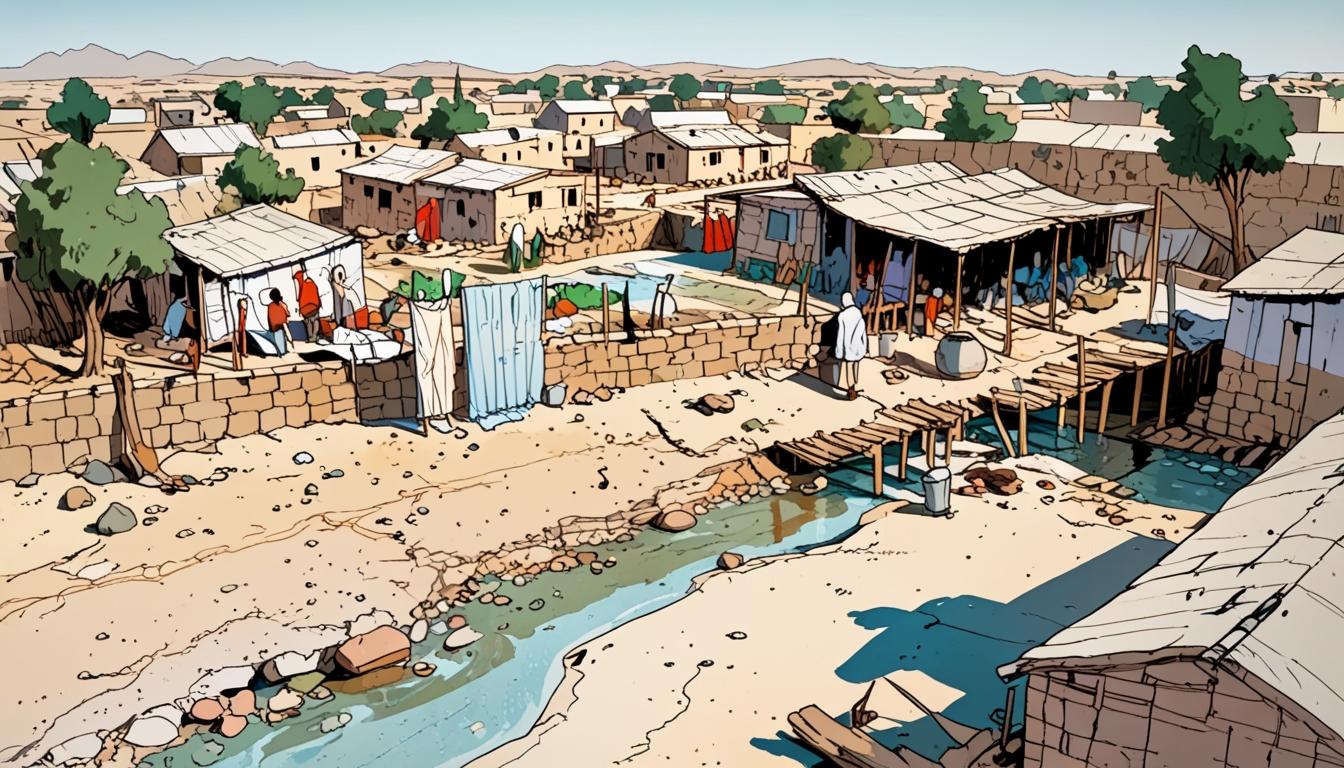Pakistan is confronting a serious resurgence of cholera amid a historic global surge in outbreaks linked to the ongoing seventh cholera pandemic. Contributing factors include climate-induced disasters, inadequate water and sanitation infrastructure, and socioeconomic challenges, prompting urgent calls for coordinated health interventions.
Pakistan is currently grappling with a resurgence of cholera amid a historic global surge in outbreaks marking the ongoing 7th cholera pandemic. Between 2022 and 2023, the world has witnessed an unprecedented rise in cholera outbreaks, including in countries such as Pakistan, Lebanon, Syria, and Haiti, some of which had not reported cases in years or had invested substantially in multisectoral control strategies.
The World Health Organisation (WHO) recently issued a call for urgent action, noting that by April 2023, at least 30 countries reported active cholera outbreaks. Furthermore, an additional 20 countries sharing land borders with affected regions are considered at significant risk of transmission. The WHO estimates that collectively more than 1 billion people worldwide now face direct risk from cholera.
In Pakistan, the disease re-emerged prominently in 2022, with outbreaks concentrated in provinces including Balochistan, Sindh, and southern Punjab. These outbreaks followed climate-induced disasters such as severe flooding and disruption to safe drinking water supplies. The increased frequency and intensity of extreme weather events—including floods, droughts, and consequent displacement—have directly contributed to the resurgence of waterborne diseases like cholera. The WHO describes this current wave as “larger, deadlier, and more widespread than previous outbreaks,” warning that it is spreading in regions previously regarded as cholera-free for years and carrying high mortality rates, posing a direct threat to global health security.
Cholera is a severe diarrheal disease caused by consuming food or water contaminated with the bacterium Vibrio cholerae. If untreated, it can cause death within hours. The disease predominantly affects communities with conditions such as poverty, conflict, poor sanitation, limited access to safe water, and fragile health systems—circumstances that persist in certain communities within Pakistan despite years of health sector reform.
In 2022, Pakistan’s Ministry of National Health Services, along with provincial health departments, reported thousands of suspected cholera cases, particularly in districts affected by flooding. The National Institute of Health (NIH) in Islamabad issued health alerts and dispatched emergency response teams to curb further spread, especially in urban slums and displaced populations confined in camps lacking proper sanitation facilities.
Health experts have emphasised that timely diagnosis and treatment—primarily through Oral Rehydration Salts (ORS) and Oral Cholera Vaccines (OCVs)—can avert most deaths from cholera. Nonetheless, inadequate investment in water, sanitation, and hygiene (WASH) infrastructure, alongside the additional pressures related to the Covid-19 pandemic and prevailing economic inflation, has left many Pakistani communities vulnerable to recurrent cycles of this disease.
The News International reports that the current situation represents a significant challenge for Pakistan’s public health system, highlighting the complex interplay of environmental, infrastructural, and socioeconomic factors underpinning the cholera resurgence.
Source: Noah Wire Services
- https://www.who.int/docs/default-source/coronaviruse/situation-reports/20240212_multi-country_outbreak-of-cholera_sitrep_11.pdf – This URL from the World Health Organization highlights the global resurgence of cholera, mentioning significant outbreaks in multiple countries and the risks faced by over a billion people worldwide due to cholera.
- https://www.gtfcc.org/wp-content/uploads/2023/03/10th-annual-meeting-gtfcc-2023-13-pakistan-khan-basheer.pdf – This document provides details on the cholera situation in Pakistan, including the number of suspected and confirmed cases from 2022 to 2023, and the affected provinces.
- https://www.ecdc.europa.eu/en/all-topics-z/cholera/surveillance-and-disease-data/cholera-monthly – This European Centre for Disease Prevention and Control (ECDC) webpage offers global surveillance data on cholera, including updates on cases reported in various countries like Pakistan.
- https://www.emro.who.int/pandemic-epidemic-diseases/cholera/acute-watery-diarrheacholera-updates-31-august-2023.html – This World Health Organization’s Eastern Mediterranean Regional Office page updates on acute watery diarrhea and cholera cases, reflecting broader regional health challenges related to these diseases.
- https://www.savethechildren.net/news/pakistan-children-face-risk-deadly-diseases-such-cholera-and-malaria-floods-expected-month – This Save the Children news article highlights the risk that Pakistani children face from diseases like cholera due to environmental factors and infrastructure challenges.
Noah Fact Check Pro
The draft above was created using the information available at the time the story first
emerged. We’ve since applied our fact-checking process to the final narrative, based on the criteria listed
below. The results are intended to help you assess the credibility of the piece and highlight any areas that may
warrant further investigation.
Freshness check
Score:
8
Notes:
The information about cholera outbreaks in Pakistan and globally, particularly referencing 2022-2023, suggests that the narrative is up-to-date but not immediately current, as it refers to events from the past year without recent updates. The mention of past global health alerts and outbreaks suggests it is not entirely outdated.
Quotes check
Score:
0
Notes:
There are no specific direct quotes in the provided text, making it impossible to verify any original source or date.
Source reliability
Score:
6
Notes:
The narrative references reputable organizations such as the World Health Organisation (WHO) and National Institute of Health (NIH), which adds credibility. However, the explicit source of the information is not a well-known publication, but it references news from The News International, a known Pakistani newspaper.
Plausability check
Score:
9
Notes:
The claims about cholera outbreaks and their link to environmental factors and poor infrastructure are plausible and consistent with known global health challenges, particularly in regions like Pakistan with recent severe flooding.
Overall assessment
Verdict (FAIL, OPEN, PASS): OPEN
Confidence (LOW, MEDIUM, HIGH): MEDIUM
Summary:
The narrative is generally plausible and supported by references to global health concerns, but its freshness is somewhat dated, and there are no direct quotes to verify. The source reliability is moderate due to the mention of credible organizations but lacks direct attribution to a highly reputable publication.













